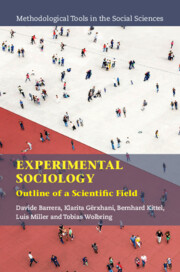Book contents
- Experimental Sociology
- Methodological Tools in the Social Sciences
- Experimental Sociology
- Copyright page
- Contents
- Figures, Tables, and Boxes
- Preface
- 1 Introduction
- Part I The Philosophy and Methodology of Experimentation in Sociology
- Part II The Practice of Experimentation in Sociology
- 6 Laboratory Experiments
- 7 Field Experiments
- 8 Vignette Experiments
- 9 Natural Experiments and Quasi-experiments
- Part III Methodological Challenges of Experimentation in Sociology
- References
- Index
9 - Natural Experiments and Quasi-experiments
from Part II - The Practice of Experimentation in Sociology
Published online by Cambridge University Press: 23 November 2024
- Experimental Sociology
- Methodological Tools in the Social Sciences
- Experimental Sociology
- Copyright page
- Contents
- Figures, Tables, and Boxes
- Preface
- 1 Introduction
- Part I The Philosophy and Methodology of Experimentation in Sociology
- Part II The Practice of Experimentation in Sociology
- 6 Laboratory Experiments
- 7 Field Experiments
- 8 Vignette Experiments
- 9 Natural Experiments and Quasi-experiments
- Part III Methodological Challenges of Experimentation in Sociology
- References
- Index
Summary
Vignette experiments are vignettes are brief descriptions of social objects including a list of varying characteristics, on the basis of which survey respondents state their evaluations or judgments. The respondents’ evaluations typically concern positive beliefs, normative judgments, or their own intentions or actions. Using a study on the gender pay gap and an analysis of trust problems in the purchase of used cars as examples, we discuss the design characteristics of vignettes. Core issues are the selection of the vignettes that are included out of the universe of possible combinations, the type of dependent variables, such as rating scales or ranking tasks, the presentation style, differentiating text vignettes from a tabular format, and issues related to sampling strategies.
Keywords
Information
- Type
- Chapter
- Information
- Experimental SociologyOutline of a Scientific Field, pp. 106 - 116Publisher: Cambridge University PressPrint publication year: 2024
